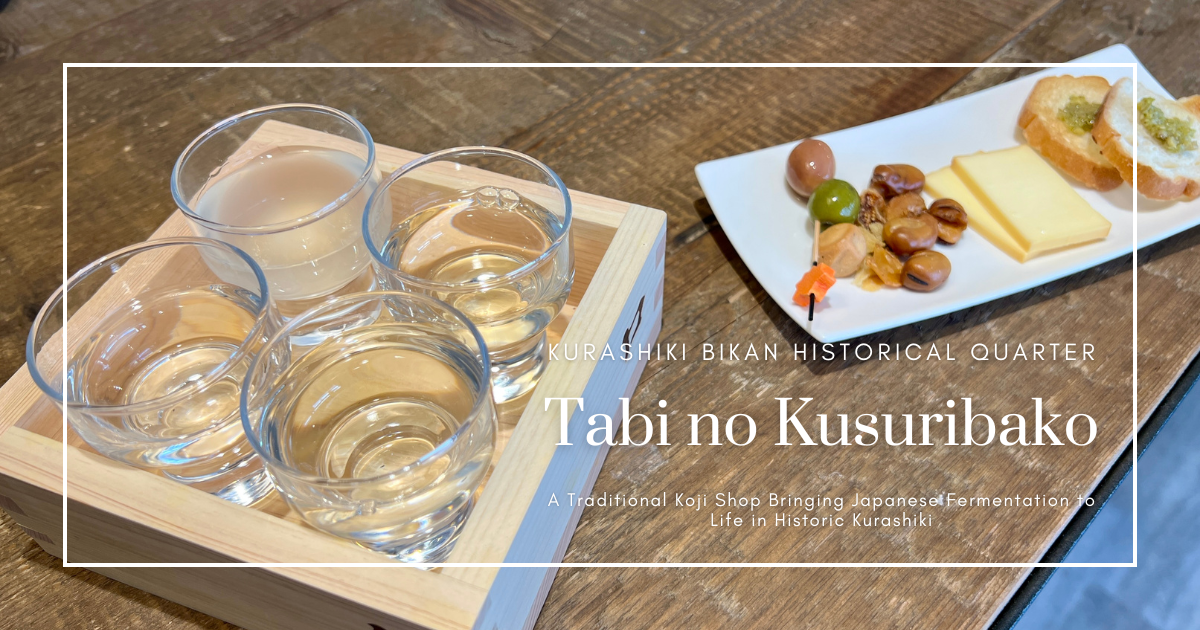
- Craft Gyoza Fes 2023 Tokyo – On-Site Report
- Explore Craft Gyoza Fes 2023 Tokyo at Komazawa Olympic Park! Discover how to enjoy every booth without waiting in line, use cashless payments smartly, and experience the exclusive Craft Gyoza Lounge.
Last updated:


White-walled townhouses, black-and-white latticework buildings, and willow-lined streets. Kurashiki’s historic district has preserved the townscapes of the Edo to Meiji periods, making it a popular tourist destination. Among the bustling streets, I encountered something truly special.
It was “Tabi no Kusuribako,” the only koji specialty shop in Okayama. Between sightseeing in Kurashiki, you can indulge in Japan’s traditional fermentation culture and enjoy a luxurious time that nourishes your body.
Inside the shop, you’ll find a selection of artisanal fermented seasonings and local sake from Okayama. Each item has been carefully curated by the shop owner, a fermentation researcher. Visitors can receive gentle guidance to discover fermented foods and sake that suit their preferences.
In addition to exploring the historic townscape and enjoying local gourmet delights, visiting “Tabi no Kusuribako” offers a unique opportunity to refresh your mind and body through traditional Japanese fermentation culture.
Let me introduce this hidden gem in Kurashiki’s historic district, where you can relax and rejuvenate both your heart and body.

Tabi no Kusuribako is a shop specializing in fermented foods located in the Kurashiki Historic District, Okayama Prefecture. The main attraction is the ability to purchase fermented seasonings made with koji by weight. Visitors can also enjoy koji drinks, Okayama’s local sake, and fermented foods on-site. It is the only shop in Okayama offering fermented seasonings by weight.

Tabi no Kusuribako features an eat-in space where visitors can sample and compare koji drinks or Okayama’s local sake. These tastings include snacks made with fermented foods.

I opted for the “Iroha ni Sake” experience. The shop offers a sake dispenser with six types of local sake, allowing customers to choose four varieties to sample.
After deliberating on my selection, here’s the finished “Iroha ni Sake.”

Four types of local sake from Okayama paired with fermented snacks.
Exploring Kurashiki’s historic district, soaking in its history, and enjoying this delightful daytime experience was pure bliss.
While enjoying local sake, koji drinks, and fermented snacks, you can also have enriching conversations with the shop’s fermentation expert. Learning about koji and fermented foods naturally prompts self-reflection about your own body and its needs.

This relaxing time during my trip—a treat to myself—allowed me to consume something good for my body while contemplating my well-being. It was a truly joyous experience.

The shop displays a variety of fermented foods available for purchase, each handpicked by the fermentation researcher and shop owner from across Japan.

In addition to fermented foods, they also offer Okayama’s local craft beer and sake.

As travelers, it’s enjoyable to select from a wide array of offerings, but knowing these items are expertly curated makes purchasing even more trustworthy.
The fermented foods and Okayama specialties available here are chosen from the perspectives of an expert or a local familiar with Okayama and Kurashiki. This provides visitors with peace of mind when making their purchases.
“Koji” refers to fermented foods made by growing koji mold on grains like rice, barley, or soybeans. It’s an essential part of traditional Japanese cuisine, mainly used in the production of seasonings and fermented foods. Koji plays a vital role in creating miso, soy sauce, vinegar, sake, and amazake.
There are several types of koji:
Examples of foods made using koji include:
Koji is rich in enzymes, amino acids, and vitamins produced during fermentation, offering numerous health benefits:

Kurashiki’s historic district captivates visitors with its picturesque streets and local gourmet offerings. Among these, “Tabi no Kusuribako” stands out as a place to add a unique touch to your journey.
Discovering fermented foods during your travels can bring new insights into your daily life. Expertly curated products make perfect souvenirs, allowing you to relive your journey while enjoying healthful moments at home.
On-site tastings of sake and koji drinks transform the simple acts of eating and drinking into deeper, educational experiences. Conversations with the fermentation expert owner offer a chance to reflect on your well-being. This elevates your sightseeing experience in Kurashiki to a new level.
Explore the historic townscape and immerse yourself in the rich tradition of Japanese fermentation culture.
When visiting Kurashiki’s historic district, be sure to stop by “Tabi no Kusuribako.”
